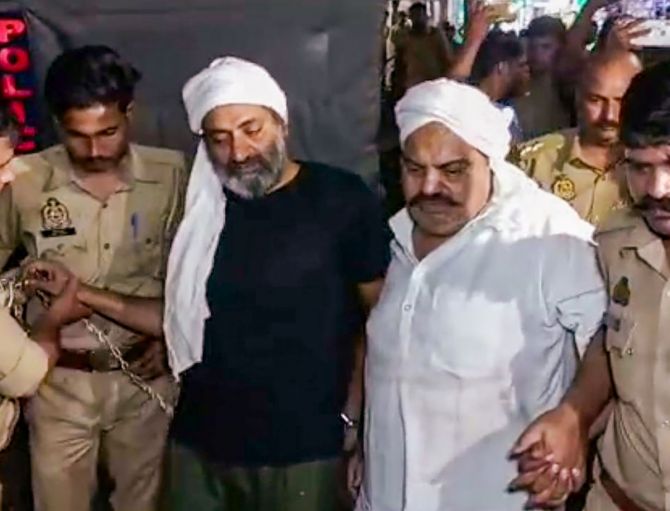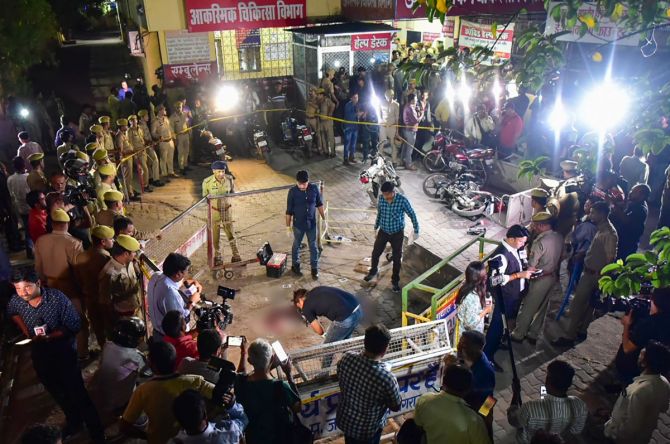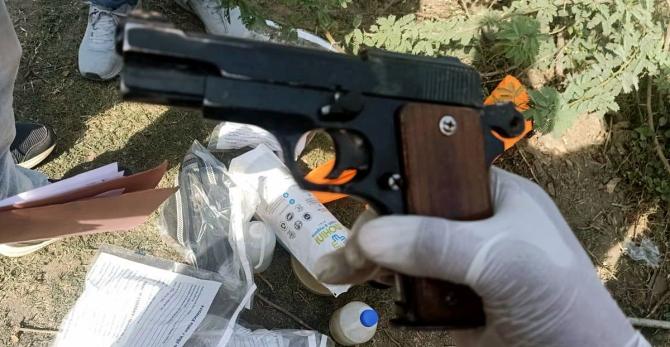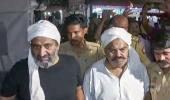The murder of Atiq and his brother and the police encounter with his son have raised many questions about the propriety of how crime is tackled by the Yogi government.
But Yogi knows he has the support of the people who are fed up with crime holding the state to ransom for decades, asserts Ramesh Menon.

While human rights activists and the Opposition were critical of the manner in which Uttar Pradesh gangsters Atiq Ahmed, his brother Ashraf Ahmed and Atiq's son Asad were shot dead, people in the state justified it, saying that they were hardened criminals and were brought to justice by Chief Minister Yogi Adityanath's government when the law failed.
This is not a new sentiment in the state.
The man on the street in any town in UP will tell you this. Criminals have dominated the state's politics for decades now.
It started with the Congress and then every party in the state that was in power went to bed with them.
Every party has its share of criminals contesting and winning elections.
It is a sad commentary on how the system failed to convict criminals and how commoners got comfortable with unconstitutional methods of getting them eliminated, like police encounters.
In the last assembly elections, Adityanath used bulldozers in election rallies to push the point that he would bulldoze the houses of criminals and those who broke the law.
It got him votes.
That the BJP under him swept the elections is a telling reminder of the times and realities we live in.
He beat incumbency as the voter saw him taking action while criminal cases in the courts dragged on for years.
Ultimately, in most of the cases, criminals walked free as all the witnesses turned hostile as they feared for their lives.
In October 2022, Adityanath at a meeting organised by the Union ministry of home affairs, said no criminal engaged in organised crime could now roam freely in his state.
The meeting was attended by chief ministers, home ministers, lieutenant governors and administrators of Union Territories.
Adityanath stressed that there was a new sense of security that women, weaker sections, and businessmen experienced due to strict action by the police.
Atiq had nearly 100 cases registered against him that covered numerous heinous crimes like murder, kidnapping, and extortion.
He grew rapidly. He had started off by stealing coal from rail wagons and selling it.
He committed his first murder when he was just 17. That was in 1979.
It was only this year that he got convicted in the kidnapping case of Umesh Pal, who was then allegedly murdered by Asad.
Umesh Pal was a key witness to the murder of Raju Pal, who was a BSP MLA. He was allegedly murdered by Atiq because he had dared to contest elections against his brother.
After the murder, his brother contested from the same seat and won.
Asad had a bounty on his head as he was one of the wanted criminals. As he did not surrender, he was killed in a police encounter.
Ashraf was accused of allegedly kidnapping two minor girls who were repeatedly raped at gunpoint.
He also had a long career, like his brother, in the criminal world and was a much feared figure.
Numerous gangsters like Hari Shankar Tiwari had a chequered political career as ministers with the BJP, SP, and BSP. He could even win an election while he was in prison.
In the 1980s, the trend of criminals entering politics started with Tiwari contesting and winning.
Then, all political parties started wooing criminals with tickets as they had clout and money power.
Criminals had sway in the social and political life of the state for ages. They used their criminal background to catapult into powerful positions in public life.
That Atiq was a former MLA for five terms and also a member of Parliament eloquently speaks of the power criminals wield.
He got elected from the Phulpur Lok Sabha constituency, that was once held by Prime Ministers Jawaharlal Nehru and Vishwanath Pratap Singh.
That should signal the kind of politics that has changed along with the voters in the state.
Atif was in fact wooed by political parties like the Samajwadi Party, the Bahujan Samaj Party, and the Apna Dal, which is now an ally of the BJP in the central government.
This gave him a kind of 'immunity' and validated his kind of life, where he was involved in brazen crimes.
Till now, property worth Rs 416 crore (Rs 4.16 billion) of Atiq and family has been seized by the state. Property of various criminals worth over Rs 2,500 crore (Rs 25 billion) has been seized and demolished
Atiq Ahmed's life was punctuated with crime from an early age. His criminal life started when he was just 17.
But he continued uninterrupted on his journey, smiling into television cameras with a certain gumption that few of his ilk had.
He knew his political connections and money power would see him through.
It did.
However, it all came to a gory end when three young men shot him and his brother in front of media personnel when he was ostensibly being taken late at night for a medical checkup by a posse of policemen. Television cameras documented the murder.

The Samajwadi Party, the Bahujan Samaj Party, and the All India Majlis-E-Ittehadul Muslimeen had given him tickets to contest elections.
While they were quick to condemn the murder, they were silent about the criminal records that the brothers had built over the years.
According to an analysis by the polling body, the Association for Democratic Reforms, of the affidavits of 45 politicians in UP who were inducted as ministers, half of them have criminal cases lodged against them, and most of them are serious ones.
In that sense, UP stands out like no other state, as lawmakers with criminal antecedents are going to decide the future of the state.
That is why when Adityanath, who has little patience for democratic norms, told the assembly that he would reduce criminals to dust, he got a lot of public support.
A guard from UP who works at a Pune guest house, could not contain his excitement when he excitedly said, "Yogi baba will not allow any criminals to survive in the state. We can now live in peace."
Politicians like Asaduddin Owaisi, a MP from Hyderabad, chose to use the occasion not to talk of Atiq's criminal past, but of the fact that he was targeted as he was a Muslim.
Yogi's officers were quick to point out that out of 66 identified gangsters that the state wants to prosecute for crimes, only 13 were Muslims, and of the 183 police encounters, only 32 percent were Muslim.
The underworld that brazenly worked overground had in many ways been responsible for the state's economy not picking up as industry and businesses were scared to invest.
Wanting to attract investments, especially in his second term, Yogi is keen to change the image of the state, which has been identified with lawlessness, crime, communalism, political violence, corruption, and police brutality.
As Atif and Ashraf were shot dead in full public view in front of journalists and policemen who were supposed to guard them, it has been embarrassing for Yogi. He has now set up an investigation into how that happened.
But no one expects it to come out with any spectacular discoveries, as violence has often been fuelled by political parties or gang lords, who often get away without being punished.
It is not going to be easy to change this image.
Such is the fear in the state that ten judges recused themselves from hearing Atif's bail plea in 2012.

Yogi needs to create employment opportunities for youngsters to be engaged with building their lives and not look up at gang lords to take to crime.
The three youngsters involved in killing Atiq and Ashraf were from poor backgrounds, were not able to access good education or get jobs.
Poverty and inequality, caste discrimination, and injustice are other factors that have fuelled crime.
Caste has played a major role, as many criminals came from the higher castes and could sway the vote bank and also ensure that they did not have any stiff opposition in the electoral contest.
The murder of Atiq and his brother and the police encounter with his son have raised many questions about the propriety of how crime is tackled by the Yogi government.
But Yogi knows he has the support of the people who are fed up with crime holding the state to ransom for decades.
However, he will have to restore the faith and credibility of the police if he wants to take his war with criminals to a logical conclusion.
Ramesh Menon, award-winning journalist, educator, documentary film-maker and corporate trainer, is the author of Modi Demystified: The Making Of A Prime Minister.
Feature Presentation: Aslam Hunani/Rediff.com










